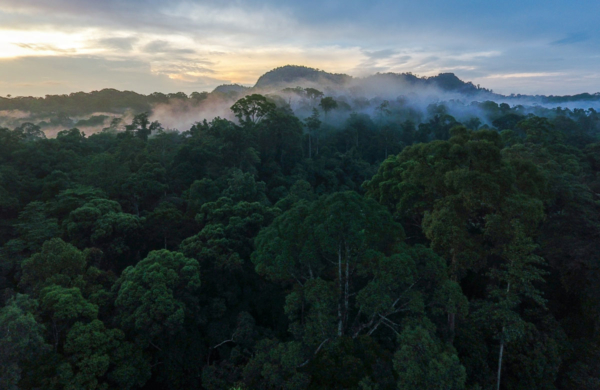Rainforest Trust
Since 1988, the U.S.-based conservation nonprofit organization Rainforest Trust has helped safeguard over 18 million acres of wildlife habitat around the world (that’s larger than the states of West Virginia and Delaware combined!). By working with in-country partners and communities to identify ecosystems that are home to the planet’s most threatened species, Rainforest Trust has helped create over 100 protected areas across Latin America, Africa and Asia.
This action is crucial, as every day nearly 70,000 acres of Earth’s rainforests are destroyed, pushing more animals to the brink of extinction. Rainforest Trust currently has efforts underway to increase protection to over 32 million acres in the coming years, and these sites are estimated to provide a place of refuge for 63 percent of the world’s bird species, 42 percent of all mammal species and 25 percent of all amphibian species. “Protecting areas is very tangible and real– we can demonstrate it on our map and can show the areas where species are being protected,” said Rainforest Trust CEO Dr. Paul Salaman. “All of our work is achieved through partnerships with experienced local conservationists who share the same passion and desire to safeguard our planet’s most endangered species.”
There are a few different ways Rainforest Trust helps establish protected areas: through their partners’ direct land purchase, the designation of national parks and reserves, or the creation of community conservation areas where local residents help maintain the sites to ensure lasting protection.
One major success was when Rainforest Trust worked with its local partner in 2016 to create the nearly 2.2 million-acre Lomami National Park in the Democratic Republic of the Congo. This conservation action was a major breakthrough in securing urgently needed rainforest protection for Central African wildlife, and was also the first national park in the country (and one of the few in Africa) to be established with major support from local communities. The expansive Lomami National Park now safeguards vital habitat in the Congo Basin – which is one of the most under-protected rainforests on Earth – for threatened wildlife such as Bonobos, Okapis and Forest Elephants.
While the conservation group supports projects that provide protection for iconic species and vast landscapes, it also focuses on animals and areas that are less well- known, but no less important. Rainforest Trust is currently partnering with a conservation organization in Panama to protect a “sky island” called Cerro Chucantí mountain that rises from sea level to 4,721 feet in elevation and is home to many animals found nowhere else in the world. Some of these species have only recently been discovered, including salamanders, frogs, snakes and numerous plants. Unfortunately, the rainforests in Cerro Chucantí are under significant threat from deforestation due to logging and cattle ranching, and Rainforest Trust and its partners are diligently working to secure this area before it is too late.
Rainforest Trust strongly believes that flourishing tropical ecosystems are imperative to maintaining a healthy planet for humans and the millions of species that share this Earth. By supporting Rainforest Trust, environmentally-conscious individuals both in the U.S. and around the world can join in making a lasting conservation impact.
To learn more about Rainforest Trust’s global conservation projects, please visit:
Convido announces sponsorship of the Rainforest Trust
Convido Just Protected Some Rainforest
I am very pleased to announce that Convido has become a sponsor of Rainforest Trust. Rainforest Trust purchases and protects the most threatened tropical forests, saving endangered wildlife through partnerships and community engagement. Through these highly effective partnerships, they can ensure sustainable results necessary for the long-term protection of tropical ecosystems and the wildlife they … Read more




